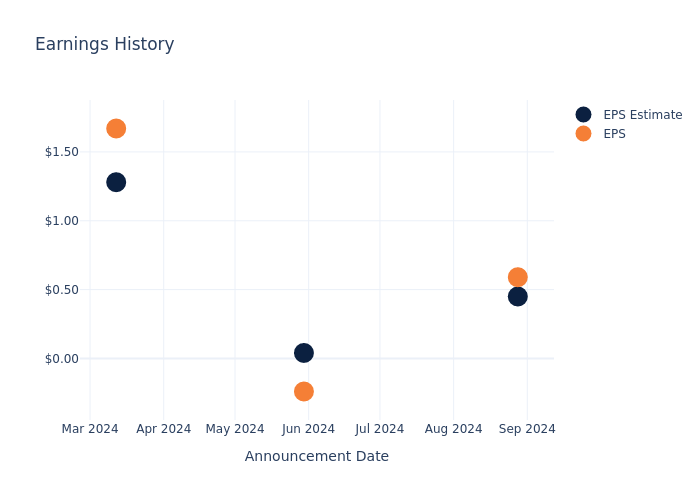Kohl's (NYSE:KSS) is gearing up to announce its quarterly earnings on Tuesday, 2024-11-26. Here's a quick overview of what investors should know before the release.
Analysts are estimating that Kohl's will report an earnings per share (EPS) of $0.31.
Investors in Kohl's are eagerly awaiting the company's announcement, hoping for news of surpassing estimates and positive guidance for the next quarter.
It's worth noting for new investors that stock prices can be heavily influenced by future projections rather than just past performance.
Performance in Previous Earnings
During the last quarter, the company reported an EPS beat by $0.14, leading to a 0.61% increase in the share price on the subsequent day.
Here's a look at Kohl's's past performance and the resulting price change:
| Quarter | Q2 2024 | Q1 2024 | Q4 2023 | Q3 2023 |
|---|---|---|---|---|
| EPS Estimate | 0.45 | 0.04 | 1.28 | 0.33 |
| EPS Actual | 0.59 | -0.24 | 1.67 | 0.53 |
| Price Change % | 1.0% | 7.000000000000001% | -0.0% | 2.0% |

Kohl's Share Price Analysis
Shares of Kohl's were trading at $17.03 as of November 22. Over the last 52-week period, shares are down 27.62%. Given that these returns are generally negative, long-term shareholders are likely unhappy going into this earnings release.
Analyst Views on Kohl's
For investors, grasping market sentiments and expectations in the industry is vital. This analysis explores the latest insights regarding Kohl's.
Analysts have provided Kohl's with 6 ratings, resulting in a consensus rating of Neutral. The average one-year price target stands at $21.0, suggesting a potential 23.31% upside.
Comparing Ratings with Peers
In this comparison, we explore the analyst ratings and average 1-year price targets of and Savers Value Village, three prominent industry players, offering insights into their relative performance expectations and market positioning.
- Savers Value Village received a Neutral consensus from analysts, with an average 1-year price target of $10.0, implying a potential 41.28% downside.
Peer Analysis Summary
The peer analysis summary presents essential metrics for and Savers Value Village, unveiling their respective standings within the industry and providing valuable insights into their market positions and comparative performance.
| Company | Consensus | Revenue Growth | Gross Profit | Return on Equity |
|---|---|---|---|---|
| Kohl's | Neutral | -4.18% | $1.60B | 1.73% |
| Savers Value Village | Neutral | 0.53% | $224.02M | 5.09% |
Key Takeaway:
Kohl's ranks higher than its peers in terms of revenue growth, with a negative growth rate compared to a positive growth rate for its peers. However, it lags behind in gross profit, with a lower figure compared to its peers. In return on equity, Kohl's also falls short, with a lower percentage compared to its peers. Overall, Kohl's is positioned in the middle among its peers based on these metrics.
All You Need to Know About Kohl's
Kohl's operates about 1,176 department stores in 49 states that sell moderately priced private-label and national brand clothing, shoes, accessories, cosmetics, and home furnishings. Most of these stores are in strip centers. Kohl's also operates a large digital sales business. Women's apparel is Kohl's largest category, having generated 26% of its 2023 sales. The retailer, headquartered in Menomonee Falls, Wisconsin, opened its first department store in 1962.
Kohl's: Delving into Financials
Market Capitalization Analysis: Falling below industry benchmarks, the company's market capitalization reflects a reduced size compared to peers. This positioning may be influenced by factors such as growth expectations or operational capacity.
Negative Revenue Trend: Examining Kohl's's financials over 3 months reveals challenges. As of 31 July, 2024, the company experienced a decline of approximately -4.18% in revenue growth, reflecting a decrease in top-line earnings. As compared to its peers, the revenue growth lags behind its industry peers. The company achieved a growth rate lower than the average among peers in Consumer Discretionary sector.
Net Margin: The company's net margin is below industry benchmarks, signaling potential difficulties in achieving strong profitability. With a net margin of 1.77%, the company may need to address challenges in effective cost control.
Return on Equity (ROE): The company's ROE is below industry benchmarks, signaling potential difficulties in efficiently using equity capital. With an ROE of 1.73%, the company may need to address challenges in generating satisfactory returns for shareholders.
Return on Assets (ROA): Kohl's's ROA falls below industry averages, indicating challenges in efficiently utilizing assets. With an ROA of 0.46%, the company may face hurdles in generating optimal returns from its assets.
Debt Management: With a below-average debt-to-equity ratio of 1.95, Kohl's adopts a prudent financial strategy, indicating a balanced approach to debt management.
To track all earnings releases for Kohl's visit their earnings calendar on our site.
This article was generated by Benzinga's automated content engine and reviewed by an editor.







